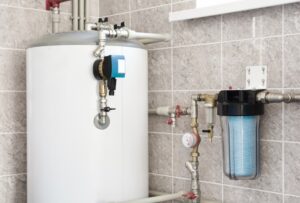When it comes to caring for the appliances and systems in your home, one of the most important ones to think about is your water heater. After all, this is a system you rely on each and every day, and you really don’t want it to fail on you out of the blue. Of course, problems are a lot less likely if you have your water heater regularly maintained each year by qualified and experienced plumbers, such as the professionals on the Dalton team.
That said, whether you’ve been keeping up on maintenance or not, it’s a good idea to know about some of the warning signs that you might have a problem with your water heater. One of these signs is the smell of rotten eggs coming from the system. This smell is the result of a gas called hydrogen sulfide, and it can be hazardous if not addressed right away. Therefore, it’s important that you give us a call if you notice the odor. In the meantime, read on to learn how hydrogen sulfide can make its way into your water heater, and how to get rid of it.
There Could Be Bacteria in Your Water Supply…
More specifically, there may be a high level of sulfur-reducing bacteria, also known as SRB in your water supply. These bacteria get energy from feeding off sulfates, and eventually, they are reduced to create hydrogen sulfide. If you have high SRB in your home’s water supply, then you may notice the smell of rotten eggs.
Now, your municipal water plan is tasked with killing off most of the SRB that can be found in water supplies. Chlorine and other chemicals are used to achieve this. But water has a long way to go between that water plant and your home, and so you may experience this issue. Additionally, if you’re using well water and not utilizing your city’s main water supply, then SRB presence is more likely.
…Or You May Have a Corroded Anode Rod
Tank-style water heaters have a component within them called the anode rod. Typically composed of magnesium or aluminum, these components are designed to draw corrosive minerals to them so that the rod starts corroding rather than the inner or outer lining of the water heater tank.
These anode rods do not last the entire lifespan of your water heater–they have to be replaced on occasion, and our team replaces them during your maintenance appointment as needed. But when they corrode, the metal reacts with the sulfates present in your water, which turns sulfate into the hydrogen sulfide you’re detecting.
“How Do I Get Rid of the Smell?”
To get rid of the smell, you need to get rid of the hydrogen sulfide.
To get rid of the hydrogen sulfide, you need to get in touch with a professional from our team so that we can assess what’s causing the issue and address it appropriately. We’re ready to help!
At Dalton Plumbing, Heating, Cooling, Electric and Fireplaces, Inc., your comfort is our promise! To set up an appointment in the Cedar Rapids area, give us a call at the number above, email customerservice@daltonphc.com or schedule an appointment online for water heater repair in Cedar Rapids, IA.

